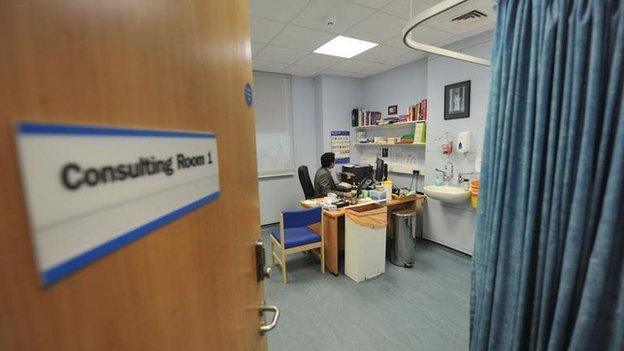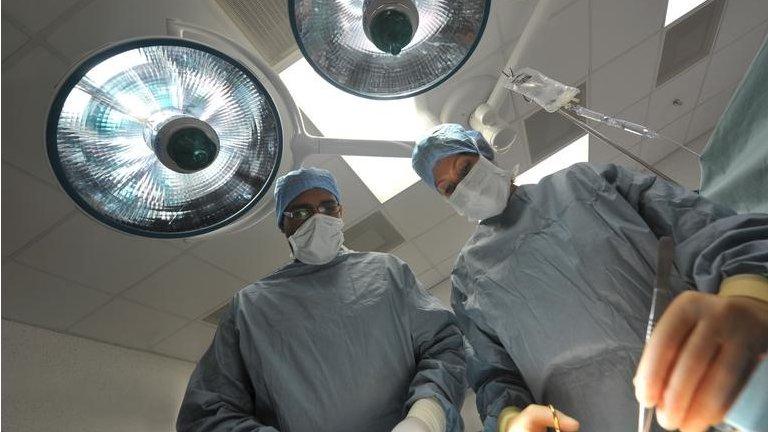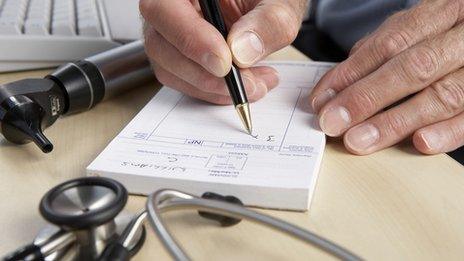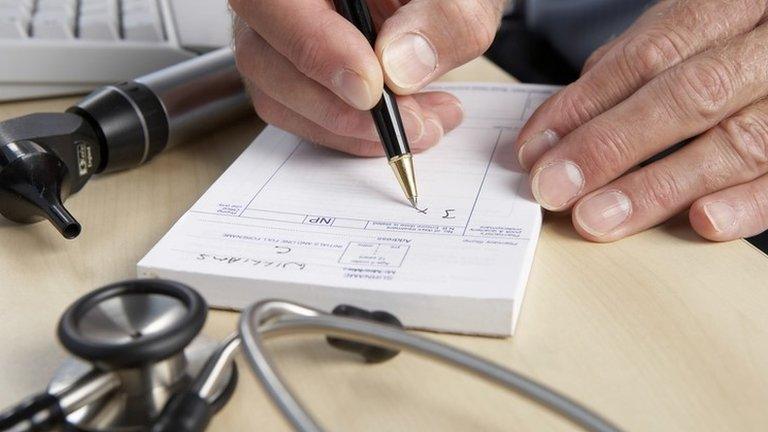David Cameron renews NHS funding pledges
- Published
- comments
David Cameron: "Diseases don't work weekdays nine to five, so neither can we"
David Cameron has renewed his vow to boost NHS funding and create a "seven-day" health service in his first major post-election speech.
The PM committed to a pre-election pledge to increase budgets by at least £8bn a year by 2020, during his speech at a GP surgery in the West Midlands.
The government is also promising to recruit 5,000 new GPs.
But doctors' representatives said without detail the announcement was "empty headline-grabbing".
Follow the reaction as it happens on Politics Live
The British Medical Association said the government was yet to explain how it would deliver additional care at a time of "chronic" doctor shortages.
Before the election, the Conservatives gave their backing to a plan by NHS England chief executive Simon Stevens to fill a funding gap estimated at £30bn a year by 2020.
This aims to make £22bn in efficiency savings, with the rest coming from taxpayers.
£100bn
NHS England budget for 2014-15
£30bn
Shortfall predicted by 2020
-
That could fund 100 hospitals
-
New ways of working could save £22bn
-
But NHS still needs an extra £8bn
Labour said before the election that Tory plans for "extreme" spending cuts threatened the NHS.
BBC health editor Hugh Pym said Mr Cameron had chosen the issue for his first major speech since the election to show "there is a real commitment to deliver" a seven-day NHS.
Death rates
Mr Cameron said his plans involved "different shift patterns" rather than NHS staff working seven days a week.
Hospitals on a Saturday and a Sunday can feel as though they are "more about getting through to Monday" with senior doctors and hi-tech equipment unavailable, he said.
Asked about funding the pledge, Mr Cameron said people should "not automatically assume" seven-day services would cost more.
Patients should be able to get a doctor's advice via Skype, Facetime or email, he said.
In his speech, Mr Cameron described the health service as the embodiment of "one nation" politics, promising the proposals would transform services across the country, with more GPs, faster access to new drugs and treatments.
The PM said it was "shocking" how death rates for patients admitted to hospital on a Sunday are up to 16% higher than those admitted on a Wednesday and that a seven-day service would help save lives.

The government is promising better access to doctors and healthcare
Speaking on BBC Radio 4's Today programme, Health Secretary Jeremy Hunt outlined the government's pledge to hire 5,000 more GPs to cover the extra hours and said many existing doctors felt they were in a "hamster wheel" of 10-minute appointments.
Asked how he would achieve this, he said the government would "look at the terms and conditions of general practice" ask "why it is that GPs have so much burnout" and question what was putting off potential recruits.
In order to hit the target, about half of medical school graduates would have to become GPs, he said.
"They need to feel they are valued... that they are part of the future," he added.
Some services, like blood tests, could be offered by nurses instead of doctors, Mr Hunt said.

Analysis: By BBC health editor Hugh Pym
Health rather than the economy is the prime minister's chosen topic for his first major speech since the election. Mr Cameron wants voters to know that pledges on the NHS made in the heat of the election battle are now firm commitments for his government.
But the question of where the extra £8bn will come from has not been made clear. That figure originally quoted by NHS England chief Simon Stevens was said to be money needed just to keep the NHS running rather than funds to expand its reach. The costs of making the NHS a full 7 day a week service have not been spelled out.
Then there is the question of where the new GPs will come from at a time when recruiting is very difficult. Setting out the aims is one thing. Delivering them by 2020 is another.

The Royal College of Nursing warned any cuts in pay associated with delivering a "seven-day" health service could lead to industrial action.
Its general secretary Peter Carter told the Independent, external there was a "very modest higher level of remuneration" for working unsocial hours, including over weekends and holiday periods.
Any changes to that would be "strongly resisted", he said, adding: "Any attack on that and I do fear it would result in industrial action."
Mr Hunt said the body was "really jumping the gun".
"We haven't made any proposals whatsoever about changing nurses terms and conditions," he said.
Dr Mark Porter, British Medical Association council chairman, said the government needed to clarify how it intended to "translate this announcement into reality".
"The real question for the government is how they plan to deliver additional care when the NHS is facing a funding gap of £30bn and there is a chronic shortage of GPs and hospital doctors, especially in acute and emergency medicine, where access to 24-hour care is vital," he said.
"Without the answer to these questions this announcement is empty headline-grabbing and shows that even after polling day, politicians are still avoiding the difficult questions and continuing to play games with the NHS."
'Financial distress'
Prof Chris Ham, chief executive of the King's Fund charity, said a seven-day NHS was "absolutely the right thing to do" but that money was "the key question".
He told Radio 4's Today programme the £8bn pledge is "to be welcomed, but that will really help to keep existing services running, it won't fund all the new commitments we've heard of during the election campaign including seven-day working".
He also said there was "real workforce shortage" in some fields, with hospitals "already struggling to recruit enough senior medical staff".
Downing Street said the GP Access Fund, set up under the previous Conservative and Liberal Democrat coalition government, was already extending opening hours.
Andy Burnham, Labour's shadow health secretary, said pre-election that Tory plans were not credible without investment in extra NHS staff.
"With the NHS in increasing financial distress, David Cameron must set out clearly how it will be paid for," he said.
- Published28 March 2015

- Published14 April 2014

- Published1 October 2013
